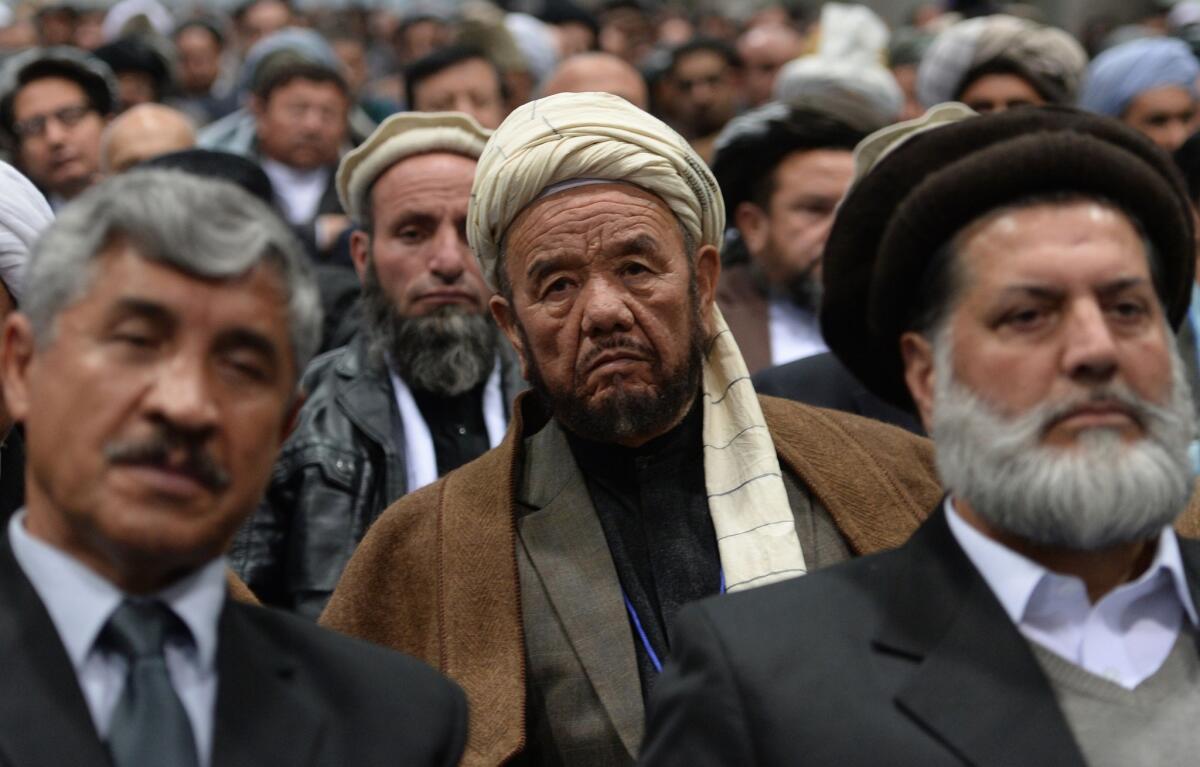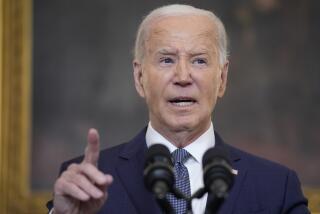Karzai says he might leave it to successor to sign U.S. accord

KABUL, Afghanistan -- Afghan President Hamid Karzai delivered a tepid endorsement of a proposed 10-year security pact with the United States in a rambling speech to an Afghan tribal gathering here Thursday, but surprised attendees by saying Afghanistan might not sign the accord until next spring.
Karzai told an assembly of 2,700 Afghans that the Bilateral Security Agreement is vital to Afghanistan’s future security. However, he complained bitterly about his relationship with the United States and suggested waiting for his successor to sign the deal after Afghan elections in April.
It was a typically mercurial twist by a politician known for his ability to maximize leverage and keep himself at the center of events. U.S. officials, who had announced agreement on a draft text just hours before Karzai’s speech, must now determine whether he was simply grandstanding for an Afghan audience or determined to extract American concessions.
The U.S. clearly expected a much quicker resolution. President Obama wrote Karzai on Thursday seeking to have the pact concluded “promptly.”
The ploy could create significant logistical challenges for the Pentagon, which is eager for a signed pact so that the military can begin planning for post-2014 deployments while closing bases and shipping home tons of vehicles, gear and equipment. Most Western combat forces are expected to be out of Afghanistan by the end of next year.
U.S. officials have asked Karzai’s office to clarify his comments because it was unclear whether he was referring to a bilateral U.S.-Afghan signature that must occur before the security pact is sent to parliament for approval, or a final presidential signature that enters the agreement into law.
Karzai’s comments capped a roller-coaster week during which some U.S. officials feared the negotiations could collapse. After two days of phone calls between Karzai and Secretary of State John F. Kerry, Karzai’s office late Wednesday received the letter from Obama that contained assurances he had asked for.
“That seemed to be enough,” said one U.S. official who requested anonymity to discuss the sensitive talks. Karzai’s remarks Thursday “posed a whole new set of complications,” although the official added that the U.S. remained hopeful the loya jirga would approve the pact.
Karzai said he reluctantly agreed to the deal, in part, after receiving Obama’s letter less than three hours before his speech. The U.S. has signed off on the agreement, pending approval by the Afghan parliament and loya jirga, the ongoing assembly of elders and prominent Afghans convened by Karzai.
Obama wrote that U.S. forces will “not enter Afghan homes for the purposes of military operations, except under extraordinary circumstances involving urgent risk to life and limb of U.S. nationals.” The security deal would create a much smaller U.S. force to Afghanistan, primarily for training and counter-terrorism, after combat troops withdraw.
Obama’s assurances met one of Karzai’s key demands, but he nonetheless accused American officials of spreading lies about him. He appeared to be positioning himself to renegotiate the previously agreed-upon text.
“My trust with America is not good. I don’t trust them and they don’t trust me,” Karzai said in Dari to the delegates, most of them white-bearded elders in ornate turbans, at the close of his 75-minute address.
“I have fought with them the last 10 years, and they have made propaganda against me,” he added, an apparent reference to depictions of Karzai by some American officials here as corrupt, cunning and unreliable.
Those arch comments set off a blast of Twitter posts by Afghans even before Karzai had finished speaking. The address was broadcast live on national TV, with citizens huddled around TV sets at home and in barber shops during a six-day loya jirga holiday declared by the Afghan leader.
Karzai did not seem inclined to temper his criticism of the U.S., even with U.S. Ambassador James B. Cunningham and Marine Gen. Joseph F. Dunford, the top commander here, in the audience.
The loya jirga is stacked with delegates appointed by or loyal to Karzai, who can manipulate the outcome, according to some Afghan politicians and analysts who say Karzai is using the gathering for political cover. The parliament is viewed as likely to endorse accord.
Karzai accused the U.S. of pressuring him to sign the deal too quickly. He insisted on taking time to study proposed language “line by line and word for word” while seeking consultation with Afghan elders.
“We wanted to be careful because we were in a weak position and the United States was in a strong position,” Karzai said.
He said Kerry rebuffed him Tuesday when Karzai suggested putting off the pact until a new Afghan president is elected. He quoted Kerry as saying NATO countries were impatient for the deal so they could plan their troop contributions after 2014.
Karzai asked the loya jirga why U.S. forces raided Afghan villages when the U.S. knows where “terrorist sanctuaries” are, referring to Pakistan. “Why don’t you go after them there?” he asked.
Despite Karzai’s brinkmanship during negotiations, the deal he presented to the loya jirga did not contain all concessions he had sought. That might explain his threat to delay signing.
U.S. troops accused of crimes in Afghanistan would be subject to U.S. rather than Afghan law, despite Karzai’s insistence on legal jurisdiction. The agreement says U.S. law also covers the “civilian component,” or Pentagon civilians, with U.S. military units. But it says Afghanistan “maintains the right to exercise jurisdiction over United States contractors” and contractors’ employees.
U.S. special operations forces would continue to conduct counter-terrorism operations in Afghan villages, with more constraints now that Afghan forces are leading combat operations. Karzai had initially demanded an end to so-called night raids.
Karzai had also pushed hard for a defense treaty obliging the U.S. to defend Afghanistan militarily against “external aggression,” specifically from Pakistan, an erstwhile U.S. ally. The U.S. resisted. Instead, the text of the agreement says the U.S. will view external aggression with “grave concern” and “consult urgently” with Afghanistan.
The agreement would extend the strategic U.S.-Afghan partnership 10 years. It would not obligate the U.S. to deploy troops to Afghanistan until 2024 - only to fund and otherwise support Afghan security forces. Either country may seek to opt out with two year’s advance notice. The pact would take effect Jan. 1, 2015.
If Afghanistan approves the agreement, NATO nations are expected to provide a limited number of troops under a separate security agreement. Gen. Dunford has privately urged the administration to keep as many as 12,000 U.S. troops, while some White House advisers have argued for as few as 6,000.
Afghan approval of the pact would mean a continued flow of billions of dollars in U.S. military and reconstruction aid. Karzai told the loya jirga that Afghanistan cannot survive without U.S. and international support.
“If they leave unhappy, that will be harmful to us,” he said of departing combat troops.
Karzai is taking a political risk in advocating for the pact, even with a long delay. He is reviled by the Taliban as an American and CIA “stooge.” Many Afghans believe he is too close to the United States and too eager to accept U.S. cash and troops.
As Karzai read aloud Obama’s praise for the sacrifices of U.S. troops, a female senator shouted him down. She screamed that Karzai cared more about American lives than the thousands of Afghan civilians killed the past 12 years. (According to the United Nations, a sizable majority of civilian deaths have been inflicted by insurgents, mostly from roadside bombs.)
For his part, Obama has committed the United States to another decade of expensive support for Afghanistan after a brutal 12-year war that cost more than 2,200 American lives, countless wounded and psychologically damaged veterans, and $96.5 billion in reconstruction aid. Opinion polls consistently show a majority of Americans weary of Afghanistan and eager to get out after the longest war in U.S. history
The U.S. invaded Afghanistan in 2001 to kill or capture Al Qaeda militants after their movement launched the 9/11 attacks from Afghan soil. After the Al Qaeda leadership fled to Pakistan, the U.S. found itself at war with the Taliban and embarked on an expensive nation-building effort designed to prevent Afghanistan from again becoming a terrorist haven.
In a remark certain to antagonize U.S. commanders, Karzai told the loya jirga: “I ask them to give me fighter jets but they give me helicopters. I ask them to give me tanks but they give me pickup trucks. I don’t want them. I can get them from Japan.”
At one point, Karzai drew ripples of laughter while demanding that the U.S. treat Afghanistan with dignity and respect as an honest partner -- “and bring a lot of money,’’ he added.
ALSO:
Drone attack kills 6 at Pakistan seminary
Iran appears to stiffen demands at nuclear talks
Poland, while hosting U.N. climate confab, sacks environment chief
Twitter: @davidzucchino
Special correspondent Hashmat Baktash in Kabul and Times staff writer Shashank Bengali in Washington contributed to this report.
More to Read
Sign up for Essential California
The most important California stories and recommendations in your inbox every morning.
You may occasionally receive promotional content from the Los Angeles Times.











